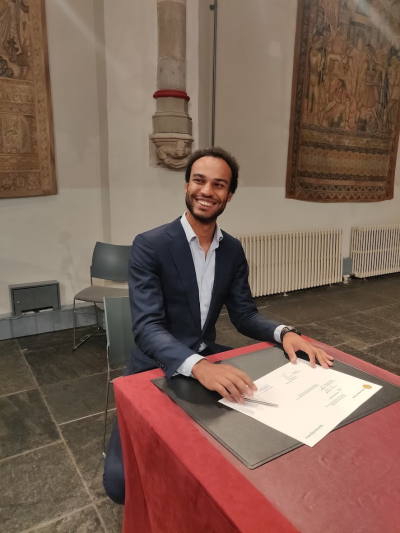 Remigration to the Caribbean islands is an ongoing issue; how do the islands get their well-educated talents back? What incentives can be offered to persuade them to return? In addition to all the known and practical factors, social-emotional factors must also be considered, argues Roman Monte. He mapped out these factors for his graduation thesis, ‘Between islands and identities; The mental journey of remigration’.
Remigration to the Caribbean islands is an ongoing issue; how do the islands get their well-educated talents back? What incentives can be offered to persuade them to return? In addition to all the known and practical factors, social-emotional factors must also be considered, argues Roman Monte. He mapped out these factors for his graduation thesis, ‘Between islands and identities; The mental journey of remigration’.
In-depth interviews
Roman, the child of a Curaçaoan father and a Dutch mother, is a master's student in Management, Policy Analysis, and Entrepreneurship in the Health and Life Sciences at the Vrije Universiteit (VU) in Amsterdam. Under the supervision of Durwin Lynch, coordinator of the master's program of the same name, he conducted in-depth interviews with thirteen Caribbean students in the Netherlands and summarized his findings. The results were shared with the two clients: Stichting WeConnect and Athena Institute, research group ‘Re/Presenting Europe’ of the VU.
Social emotional
Thirteen students and young professionals from five islands participated in the personal interviews that were conducted in Papiamentu, English, and Dutch. Cultural identity, especially expressed in the ability to speak one's own language, turned out to be an important factor. "I don't make jokes in Dutch because they get lost in translation." One of the Curaçaoan interviewees remarked.
Other factors are family ties, appreciation for the lifestyle, and the slower pace of life on the islands. Or as a negative factor, racism and discrimination or little knowledge of and appreciation for the colonial past in the Netherlands. An Aruban participant emphasized the timing of remigration: "I am still young, without a partner, children, and a house in the Netherlands. So I have to make that decision to go back before that changes." Personal matters, such as being able to be yourself and experiencing quality of life, make it difficult to make one-on-one connections.
Recommendations
The student researcher comes up with concrete recommendations; for example, WeConnect can develop a remigration manual, organize more workshops on immigration, and create an online forum for practical matters such as housing and vacancies. Students and young professionals are called upon to actively reflect on their desire to return and to share those reflections with others. Caribbean employers are advised to organize 'cultural onboarding' for remigrants and to simplify the bureaucracy surrounding remigration.
Collaboration
Internship supervisor Durwin Lynch of the VU explains how this research fits into a broader collaboration between the VU and WeConnect. Roman is the third shared Master's student that we have supervised as an intern. We are learning increasingly about creating SafeSpaces where Caribbean students can talk about their emotions, mental well-being, and ‘sense of belonging’. These are important themes that influence the identity formation, general health and study success of our Caribbean students and young professionals here in the Netherlands. Our collaboration contributes to insights that can smooth the study progress.”
Personal journey
For Roman Monte, this research also turned out to be a personal quest for his Curaçao identity. He knew the island from family visits, holidays and a longer stay of four months with his aunt. It has certainly strengthened his bond, also with the other islands: “The research gave me insight into why on the one hand I would like to live on Curaçao, but on the other hand I would find it very difficult to leave the Netherlands.” He adds that he now also understands better why he feels more at home in certain places. “For example, there is a Curaçaoan trùkipan (food truck) near my house in Amsterdam. Here you can eat pastechi and speak Papiamentu. Although I don’t always go, it always gives me a feeling of home when I see them.” Finally, he is grateful and happy to complete his master’s degree this summer with this broad internship research and looks forward to a successful start on the job market.
The entire research ‘Between islands and identities; The mental journey of remigration’ can be read via this link (in English).










